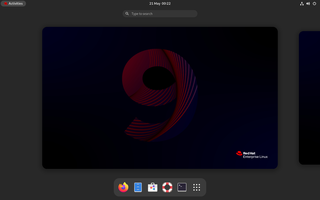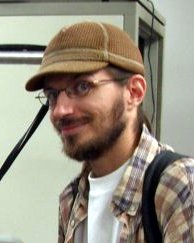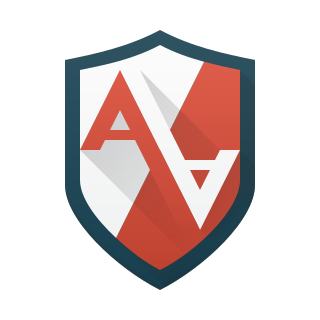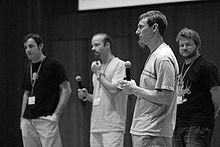
A Linux distribution is an operating system made from a software collection that includes the Linux kernel and often a package management system. They are often obtained from the website of each distribution, which are available for a wide variety of systems ranging from embedded devices and personal computers to servers and powerful supercomputers.

Red Hat, Inc. is an American software company that provides open source software products to enterprises and is a subsidiary of IBM. Founded in 1993, Red Hat has its corporate headquarters in Raleigh, North Carolina, with other offices worldwide.
XFS is a high-performance 64-bit journaling file system created by Silicon Graphics, Inc (SGI) in 1993. It was the default file system in SGI's IRIX operating system starting with its version 5.3. XFS was ported to the Linux kernel in 2001; as of June 2014, XFS is supported by most Linux distributions; Red Hat Enterprise Linux uses it as its default file system.

Security-Enhanced Linux (SELinux) is a Linux kernel security module that provides a mechanism for supporting access control security policies, including mandatory access controls (MAC).
Reiser4 is a computer file system, successor to the ReiserFS file system, developed from scratch by Namesys and sponsored by DARPA as well as Linspire. Reiser4 was named after its former lead developer Hans Reiser. As of 2021, the Reiser4 patch set is still being maintained, but according to Phoronix, it is unlikely to be merged into mainline Linux without corporate backing.

Red Hat Enterprise Linux (RHEL) is a commercial open-source Linux distribution developed by Red Hat for the commercial market. Red Hat Enterprise Linux is released in server versions for x86-64, Power ISA, ARM64, and IBM Z and a desktop version for x86-64. Fedora Linux and CentOS Stream serve as its upstream sources. All of Red Hat's official support and training, together with the Red Hat Certification Program, focuses on the Red Hat Enterprise Linux platform.

David Stephen Miller is an American software developer working on the Linux kernel, where he is the primary maintainer of the networking subsystem and individual networking drivers, the SPARC implementation, and the IDE subsystem. With other people, he co-maintains the crypto API, KProbes, IPsec, and is also involved in other development work.
seccomp is a computer security facility in the Linux kernel. seccomp allows a process to make a one-way transition into a "secure" state where it cannot make any system calls except exit , sigreturn , read and write to already-open file descriptors. Should it attempt any other system calls, the kernel will either just log the event or terminate the process with SIGKILL or SIGSYS. In this sense, it does not virtualize the system's resources but isolates the process from them entirely.
OS-level virtualization is an operating system (OS) virtualization paradigm in which the kernel allows the existence of multiple isolated user space instances, called containers, zones, virtual private servers (OpenVZ), partitions, virtual environments (VEs), virtual kernels, or jails. Such instances may look like real computers from the point of view of programs running in them. A computer program running on an ordinary operating system can see all resources of that computer. However, programs running inside of a container can only see the container's contents and devices assigned to the container.

AppArmor is a Linux kernel security module that allows the system administrator to restrict programs' capabilities with per-program profiles. Profiles can allow capabilities like network access, raw socket access, and the permission to read, write, or execute files on matching paths. AppArmor supplements the traditional Unix discretionary access control (DAC) model by providing mandatory access control (MAC). It has been partially included in the mainline Linux kernel since version 2.6.36 and its development has been supported by Canonical since 2009.

Greg Kroah-Hartman is a major Linux kernel developer. As of April 2013, he is the Linux kernel maintainer for the -stable branch, the staging subsystem, USB, driver core, debugfs, kref, kobject, and the sysfs kernel subsystems, Userspace I/O, and TTY layer. He also created linux-hotplug, the udev project, and the Linux Driver Project. He worked for Novell in the SUSE Labs division and, as of 1 February 2012, works at the Linux Foundation.
Upstart is a discontinued event-based replacement for the traditional init daemon—the method by which several Unix-like computer operating systems perform tasks when the computer is started. It was written by Scott James Remnant, a former employee of Canonical Ltd. In 2014, Upstart was placed in maintenance mode, and other init daemons, such as systemd, were recommended in place of Upstart. Ubuntu moved away from Upstart with the release of version 15.04 in favor of migrating to systemd. As of June 2024, there have been no updates released for Upstart since September 2014.

Kernel-based Virtual Machine (KVM) is a free and open-source virtualization module in the Linux kernel that allows the kernel to function as a hypervisor. It was merged into the mainline Linux kernel in version 2.6.20, which was released on February 5, 2007. KVM requires a processor with hardware virtualization extensions, such as Intel VT or AMD-V. KVM has also been ported to other operating systems such as FreeBSD and illumos in the form of loadable kernel modules.

The Linux Foundation (LF) is a non-profit organization established in 2000 to support Linux development and open-source software projects.
Opposition to software patents is widespread in the free software community. In response, various mechanisms have been tried to defuse the perceived problem.
Qumranet, Inc. was an enterprise software company offering a desktop virtualization platform based on hosted desktops in Kernel-based Virtual Machines (KVM) on servers, linked with their SPICE protocol. The company was also the creator, maintainer and global sponsor of the KVM open source hypervisor.

Alexandre "Alex" Oliva, is a Brazilian free software activist, developer, former vice president of the board of directors of the Free Software Foundation (FSF) and founding member of Free Software Foundation Latin America (FSFLA). He is currently on-hold from his PhD studies at the Institute of Computing of the State University of Campinas, Brazil whilst working as a compiler engineer at Red Hat, contributing in the GCC compiler. He is the maintainer of Linux-libre, a fork of the Linux kernel which removes non-free software components, such as binary blobs from the kernel. The Linux-libre kernels are used in Linux distributions such as Parabola GNU/Linux-libre and Trisquel, all of which are recommended by the Free Software Foundation and the GNU Project.
Sage Sharp is an American software engineer who has worked on the Linux kernel, including serving on the Linux Foundation's Technical Advisory Board for two years. Sharp is non-binary and uses the pronouns "they" and "them".










